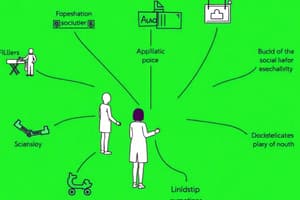Podcast
Questions and Answers
Sociology is the study of society, social institutions, and social relationships.
Sociology is the study of society, social institutions, and social relationships.
True (A)
Cultural components do not include symbols or language.
Cultural components do not include symbols or language.
False (B)
Socialization involves learning the norms and values of one’s society.
Socialization involves learning the norms and values of one’s society.
True (A)
Social institutions do not include family and education.
Social institutions do not include family and education.
Quantitative methods in sociology include interviews and participant observation.
Quantitative methods in sociology include interviews and participant observation.
Conflict theory emphasizes struggles between different social classes.
Conflict theory emphasizes struggles between different social classes.
Max Weber was known for his studies in structural functionalism.
Max Weber was known for his studies in structural functionalism.
Globalization is one of the current trends affecting cultures today.
Globalization is one of the current trends affecting cultures today.
Flashcards are hidden until you start studying
Study Notes
Definition
- Sociology is the study of society, social institutions, and social relationships.
Key Concepts
-
Social Structure
- Framework of society that organizes interactions.
- Includes institutions, social roles, and norms.
-
Culture
- Shared beliefs, values, and practices within a group.
- Components include symbols, language, norms, and values.
-
Socialization
- The process through which individuals learn and internalize the values and norms of their society.
- Key agents: family, schools, peers, mass media.
-
Social Institutions
- Established systems that meet societal needs.
- Includes family, education, religion, economy, and government.
-
Groups and Organizations
- Primary groups: small, close-knit, personal relationships (e.g., family).
- Secondary groups: larger, more impersonal, goal-oriented organizations (e.g., workplaces).
Research Methods
- Quantitative Methods: Surveys, experiments, and statistical analysis.
- Qualitative Methods: Interviews, ethnography, content analysis, and participant observation.
Theoretical Perspectives
-
Structural Functionalism
- Views society as a complex system with parts that work together to promote stability.
- Each part has a function that contributes to social order.
-
Conflict Theory
- Focuses on power dynamics and social inequalities.
- Emphasizes the struggles between different social classes.
-
Symbolic Interactionism
- Examines everyday interactions and the meanings individuals attach to them.
- Focuses on symbols and language in communication.
Key Sociologists
- Émile Durkheim: Pioneer of functionalism; studied social cohesion and suicide.
- Karl Marx: Focused on class conflict and economic inequality.
- Max Weber: Explored the impact of culture on social action and emphasized verstehen (interpretive understanding).
Current Trends
- Globalization and its impact on cultures.
- The rise of social media and its influence on social interactions.
- Issues of race, gender, and class in contemporary society.
Applications
- Sociology is applied in various fields such as education, healthcare, urban planning, and public policy to understand and improve societal issues.
Definition
- Sociology studies society, institutions, and relationships among individuals.
Key Concepts
- Social Structure: Framework of society organizing interactions, comprising institutions, roles, and norms.
- Culture: Shared beliefs and practices of a group, including symbols, language, norms, and values.
- Socialization: Process by which individuals learn societal values and norms, primarily through family, schools, peers, and mass media.
- Social Institutions: Established systems addressing societal needs, such as family, education, religion, economy, and government.
- Groups and Organizations: Differentiates between primary groups (close-knit, personal, e.g., family) and secondary groups (larger, goal-oriented, e.g., workplaces).
Research Methods
- Quantitative Methods: Employs surveys, experiments, and statistical analysis to gather numerical data.
- Qualitative Methods: Includes interviews, ethnography, content analysis, and participant observation for in-depth understanding.
Theoretical Perspectives
- Structural Functionalism: Views society as a system where various parts work together, with each serving a specific function to maintain social order.
- Conflict Theory: Analyzes power dynamics and social inequalities, focusing on conflicts among social classes.
- Symbolic Interactionism: Studies everyday interactions, highlighting the meanings individuals attach to symbols and language.
Key Sociologists
- Émile Durkheim: Functionalism pioneer, studied social cohesion and the phenomenon of suicide.
- Karl Marx: Examined class conflict and highlighted economic inequalities in society.
- Max Weber: Investigated how culture influences social actions, emphasizing the concept of verstehen (interpretive understanding).
Current Trends
- Globalization: Ongoing changes affecting cultures worldwide and their interconnections.
- Social Media: Its growing influence on social interactions and communication.
- Social Issues: Examination of race, gender, and class dynamics in modern contexts.
Applications
- Sociology is utilized in diverse fields such as education, healthcare, urban planning, and public policy, aiming to understand and address societal challenges.
Studying That Suits You
Use AI to generate personalized quizzes and flashcards to suit your learning preferences.



